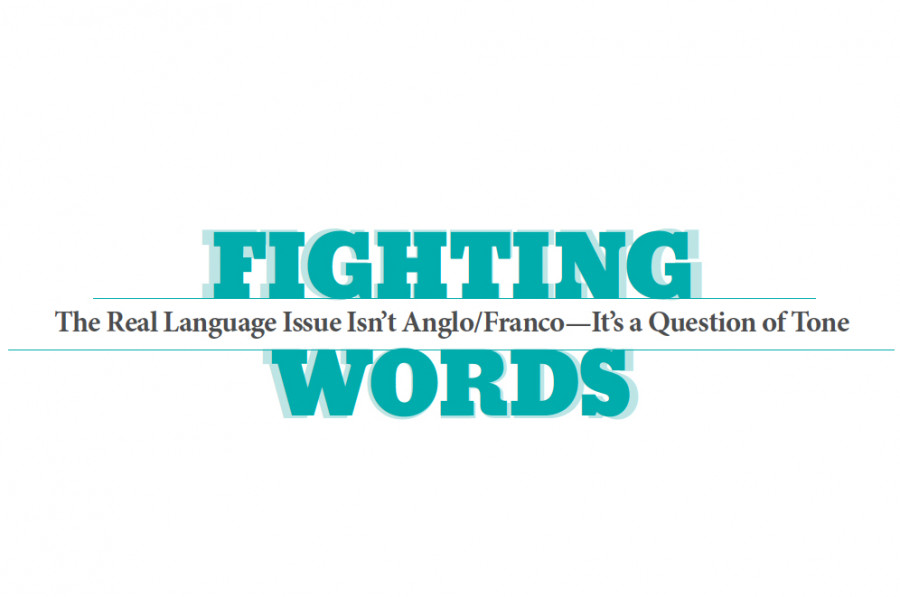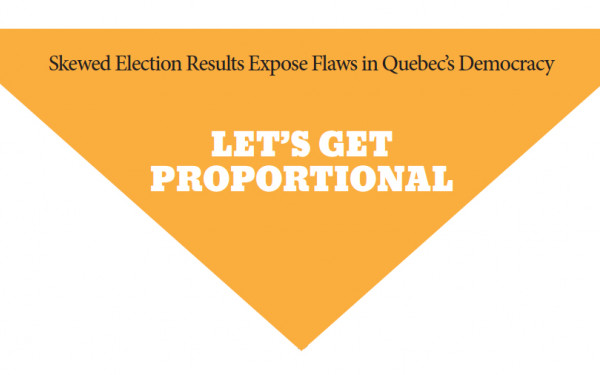Fighting Words
The Real Language Issue Isn’t Anglo/Franco–It’s a Question of Tone
On the night of Sept. 4, all eyes were on Pauline Marois, joyously giving her victory speech, and her every word seemed to spark loud conversation, in the bars and online. And then, in an instant, there was chaos.
Marois was being pulled offstage by security and Radio-Canada was cutting to a feed outside of a man pinned to the ground by police—and that long-barreled gun.
What happened outside the Metropolis was a tragedy no one could have expected, committed not by a political movement, but by a sick man with access to weapons.
Not 48 hours after the horrific event, however, in response to the shooter’s cries of “Les anglais se réveillent!”—“The English are rising!”—the Société Saint-Jean-Baptiste came out to blame English media for divisive editorial content about language politics fostering an environment where such a tragedy can happen.
SSJB President Mario Beaulieu believes the English media is responsible for the province’s “climate of fear.”
And despite the biting irony that this was shouted by a group whose members include Front de liberation du Québec bombers, there’s a point made that warrants consideration.
Did we foster an environment that allowed this senseless act of violence to happen? And if the media is in part to blame, what can be done to make things better? After all, the shooter wasn’t raised in a vacuum, even if the alleged assailant spent most of his time in a fishing lodge.
An easy answer—with a complex execution—is censorship. But this is dangerous territory; driven on the premise that, as individuals, we cannot critically digest the information we’re constantly consuming.
And if pundits can share the blame for a political climate where an unstable person can see indiscriminate murder as an answer, then by the same logic, thousands of peaceful protesters share blame for creating an environment that includes the most violent acts of the printemps érable committed by a small minority.
And if pundits can share the blame for a political climate where an unstable person can see indiscriminate murder as an answer, then by the same logic, thousands of peaceful protesters share blame for creating an environment that includes the most violent acts of the printemps érable committed by a small minority.
It’s an argument that was put forward by many supporters of Charest’s Special Law, but if the huge resistance to that legislation taught us anything, Quebec will not tolerate limitations to free expression simply in the name of maintaining order.
And while many column inches were used in the National Post, The Globe and Mail and The Gazette to stoke old fears of Quebec’s secession and language policing, the blame can’t solely be placed on the English media.
As psychoanalyst Nicolas Lévesque said in an interview with Le Devoir, “The psychologist in me is certain that this man’s delusion would not have taken this form if Quebec was a place where we could truly discuss.”
He writes that the reduction of politics to emotional responses and forced polarization puts us all at least somewhat to blame for what happened.
But unlike the SSJB, Lévesque criticizes the sensationalism, the alarmism and the straw men at work in both languages, going on to criticize the likes of Voir ’s Richard Martineau and the Journal de Montréal ’s Stéphane Gendron for their polarizing tone.
The point both Lévesque and the SSJB are making—albeit the latter hypocritically—is that violent words beget violent action.
But it’s not just the English media, or even media in general, that can be held responsible. If a “climate of fear” is even marginally responsible for the shooting, then the tremendous prevalence of the secession rhetoric on the campaign trail by all major parties has to be examined.
Like Stephen Harper’s claim to power through a platform of economic stability and growth vs. scary uncertainty, Jean Charest campaigned on the point that his Liberal Party was the answer to avoiding calamity; in his case, the only surefire defense against a referendum. But unlike the infamous Rest of Canada, Quebec didn’t take the bait.
Marois, perhaps necessarily, campaigned with much time spent on the identity issue. And while some would call her tactics defensive, hinged in the protection of a culture surrounded by difference, others see it as an offensive, targeting Anglophones, First Nations and immigrants.
Because, as Radio-Canada reporter Aurélie Lanctôt blogged, “Us francophones worried about our ‘survival’ have a habit of closing ourselves in a solipsistic view of Québécois society.”
And it’s true that it is quite easy to forget that Quebec’s richness of culture is a product of an interaction with a greater environment, when its distinctness is seen so immediately.
So, to give columnists in the National Post some credit, talks of a conditional citizenship (like Marois has discussed) are worth sounding the alarm.
But positing an anglo exodus from la Belle Province as a rational option is doing a disservice to its readers. It makes the unstable cognizant of an inaccurately portrayed black-and-white issue that they equate to their personal struggle.
To the English media, of which perhaps I am especially critical of because I see myself as some small component thereof, it would do everyone good to shelve any talks of border patrols in Gatineau and some kind of French-language take on The Warriors becoming the rule of law.
Even if it makes for an entertaining read, going to extremes won’t help solve anything.





_600_375_90_s_c1.jpg)
